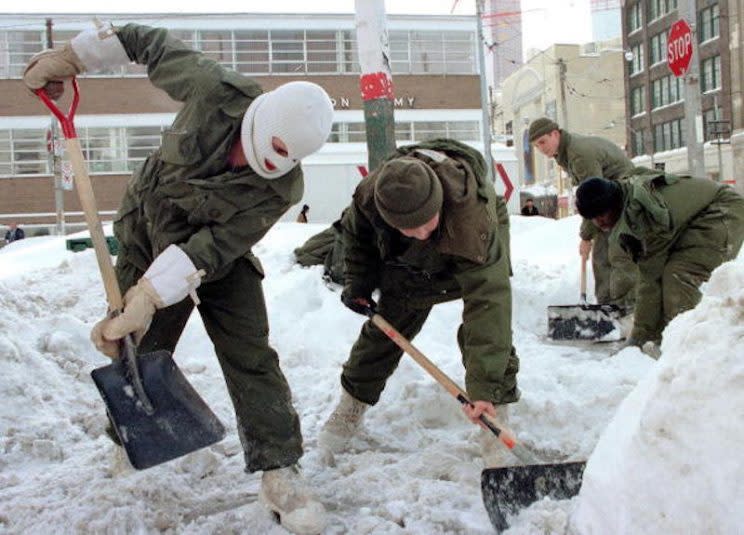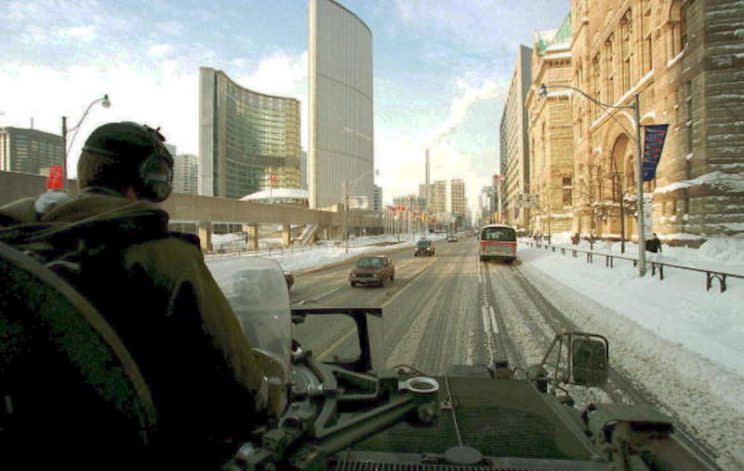Toronto marks 18 years since army called in due to snow

It was the day Toronto sealed its fate as the most mocked city in Canada.
On Jan. 13, 1999, many Torontonians were outside shoveling snow. And if you were in Canada’s military, you might’ve been getting ready to do the same.
That’s because exactly 18 years ago, the city’s then-mayor Mel Lastman decided to call in the troops to help fight the remnants of a massive snowfall in Toronto. It marked a day the rest of Canada would never forget by providing the punchline of a joke that never seems to get old.
On this day in 1999: Toronto mayor calls in troops to shovel out massive snowfall. @adriearsenault reports: https://t.co/5JPA5qwFxS pic.twitter.com/4PSXqjG0Mb
— CBC Digital Archives (@cbc_archives) January 13, 2017
It all started on Jan. 2, 1999, with a winter storm that dropped a whopping 38 centimetres of snow onto city streets over a 12 to 15-hour period, Toronto city records show. The following day, the mayor declared the first snow emergency in 16 years.
But the snow didn’t stop coming down. Over a 11-day period, 112 cm of white fluff accumulated to blanket the downtown core with more snow than officials were prepared to deal with, according to the city. Schools, offices and roads were closed, highways were crippled and public transit vehicles were practically abandoned.
“Stay home,” said David Gunn, who was serving as head of the Toronto Transit Commission at the time. “If it’s snowing, I would stay home. That’s my best advice,” the CBC reported on Jan. 15, 1999.
“How is an ambulance supposed to get through this?” Lastman asked in a Toronto Star article published on Jan. 11, 2009 — a decade after the blizzard.
Just before more flurries were expected on Jan. 14, the mayor decided the city needed help in case of an emergency. Art Eggleton, a former Toronto mayor who was serving as the defence minister at the time, agreed that “an untenable situation” could’ve occurred with the inability of emergency vehicles to get around the city, the Toronto Star reported.

And so, with the blessing of the federal government, the Canadian Forces came to battle an unusual foe: the snow.
More than 400 soldiers made their way across Ontario from CFB Petawawa in armoured vehicles ready to take on the weather. If someone was having a medical emergency and needed to be transported to hospital, the vehicles were ready.
“There’s only a storm like that every 100 years,” Lastman told the Toronto Star, adding some volunteers came all the way from Prince Edward Island to free the city of winter’s bitter grip. “Let me tell you, they worked like hell.”
For their efforts, some troops were handed free tickets to watch a Toronto Maple Leafs hockey game.
While the decision may have potentially saved lives, it also earned Toronto years of ridicule from the rest of the country. From coast to coast, the largest city in Canada was the butt of many jokes.
According to Allan Levine’s book, Toronto: Biography of a City, the Montreal Gazette newspaper ran a cartoon with a caption that read: “Item: World Class Wimps in Toronto Call in the Army to Deal with a Bit of Snow.”
Even factions of the CBC, with its Canadian Broadcasting Centre located in the Ontario capital, couldn’t resist a jab at the Big Smoke.
Major snowstorm headed to southern Ontario, but don't worry — Toronto city hall has the military on speed dial.
— 22Minutes (@22_Minutes) February 7, 2013
But years later, Lastman stuck to his guns — or, in this case, shovels — and reiterated the need for the army to be brought in. A decade after his unconventional call for help, the Bad Boy Furniture chain founder told the Toronto Star he made the right decision.
“Would I do it again? You’re darn right I would!”



